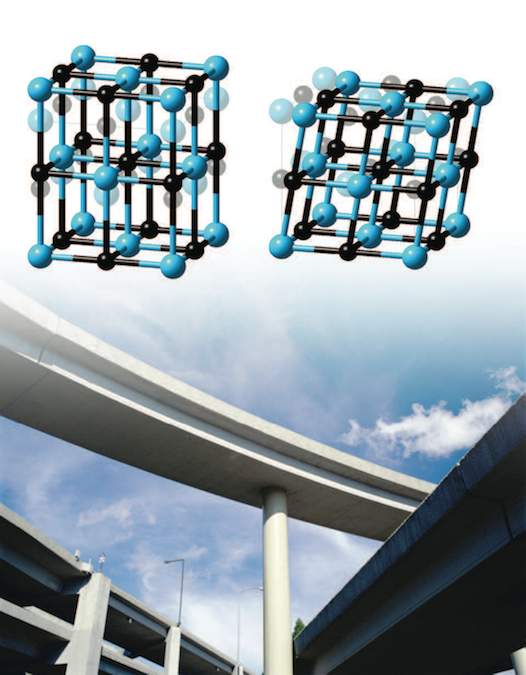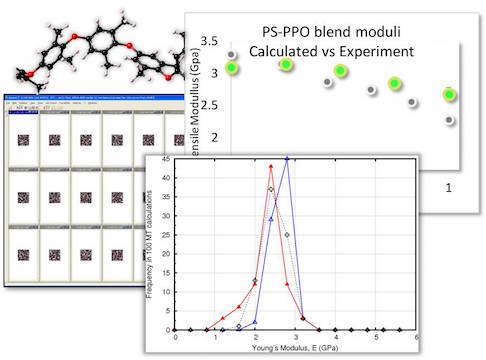MedeA MT - Explore Elastic Response and Mechanical Stability of Materials
At-a-Glance
MedeA®[1] MT highly efficiently and effectively calculates key mechanical and thermodynamic properties of metals, semiconductors, ceramics, glasses, polymers, and thermosets.
Key Benefits
- Fully automated and robust computational procedure, designed to achieve utmost accuracy for the elastic coefficients as compared to other available approaches
- Automatic prediction of a wealth of derived, technologically important data, such as stability analysis, polycrystalline moduli, descriptors for hardness and ductility, Debye temperature, and estimates for the thermodynamic functions
- Statistically rational results, especially for polymers, thermosets, and amorphous systems
- Straightforward combination of different computational approaches in a single workflow

By means of a fully automated procedure evaluating the elastic response to lattice distortions [2], MedeA MT calculates mechanical and thermodynamic properties of crystalline, polycrystalline, and amorphous materials. Especially, for amorphous materials MedeA MT precisely and quantitatively predicts elastic properties by means of statistical sampling within the Hill-Walpole approach, as improved by Suter and Eichinger. [3]
‘The symmetry generality of the approach described here enabled the creation of a robust user interface going seamlessly from the database search to the printout of the elastic coefficients. With it, even nonspecialist users can reliably produce technologically relevant results…’
Yvon LePage and Paul Saxe (abstract of [2])
Properties from MedeA MT
- Elastic coefficients with estimation of numerical uncertainty
- Mechanical stability analysis, using the eigenvalues of the elastic coefficient matrix
- Elastic moduli (bulk, shear, and Young’s moduli) from polycrystalline averaging (Voigt, Reuss, and Hill)
- Precise bounds estimate for elastic properties of polymers and glasses
- Poisson’s ratio, Pugh’s ratio, and Vickers hardness as descriptors for Poisson effect, ductility, and hardness
- Velocity of sound
- Debye temperature
- Temperature dependent thermodynamic functions calculated within the Debye model
- Heat capacity
- Zero-point energy
- Vibrational enthalpy, entropy, and free energy
- Temperature dependent thermal expansion coefficient estimated from Debye-Grüneisen approach

Computational Characteristics
- Predicts key mechanical properties within the elastic regime
- Automatic detection and use of any space-group symmetry
- Iterative full relaxation of all atomic degrees of freedom of distorted structures resulting in utmost accuracy (as compared to exploiting the Hessian only once)
- Supported compute engines for optimization and stress tensor evaluation
- MedeA VASP – recommended for metals, semiconductors, ceramics, and molecular crystals
- MedeA LAMMPS – recommended for polymers and thermosets, and amorphous materials
- MedeA MOPAC – recommended for molecular crystals
- Determination of minimum set of elastic coefficients, compliances, and their matrices
- Configurational sampling and improved Hill-Walpole bounds analysis for polymers, thermosets, and amorphous systems
- Exhaustive use of methods available in MedeA VASP, such as LDA, GGA, GGA+U, meta-GGA, van der Waals, and hybrid functionals, spin-polarization, and fully relativistic Hamiltonians
- Fully automated setup, execution, and processing of calculations with any of the recommended compute engines
- Restart capabilities in case of hardware or any other failures
Required Modules
- MedeA Environment
Recommended Modules
- MedeA VASP (required for ab-initio prediction of mechanical and thermal properties)
- MedeA HT-Launchpad (required for Hill-Wallpole sampling)
- MedeA HT-Descriptor
- MedeA Amorphous Materials Builder (required for polymers, thermosets and amorphous materials)
- MedeA Pearson
Tightly Integrated Modules
- MedeA EAM
- MedeA MOPAC
Find Out More
Watch the Webinar: Predicting Elastic Properties Using Ab Initio and Forcefield Based Simulations
Learn how to calculate elastic constants with MedeA VASP 5 and MedeA LAMMPS in these tutorials:
Applications of MedeA MT are demonstrated in the following Materials Design Application Notes:
- Stability of Alkaline-Earth Hydrides
- Elastic coefficients and moduli for silicon carbide (\(\beta\) -SiC), corundum (\(\alpha\)-Al2O3\), and ferric tourmaline (schörl)
- Change of Elastic Properties of Graphite Electrode upon Li Intercalation
- Effect of Resin Molecular Architecture on Epoxy Thermoset Mechanical Properties
| [1] | MedeA and Materials Design are registered trademarks of Materials Design, Inc. |
| [2] | Y. LePage and P. Saxe, Physical Review B 65, 104104 (2002) |
| [3] | U. W. Suter and B. E. Eichinger, Polymer 43, 575 (2002) |
| download: | pdf |
|---|